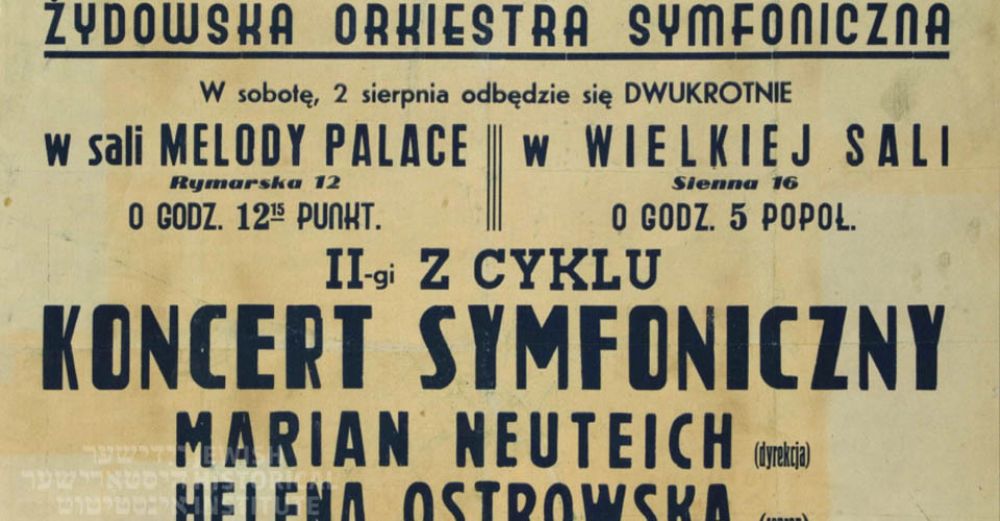- News
- Events
- Oneg Shabbat
- Collections
- Research
- Exhibitions
- Education
- Publishing Department
- Genealogy
- About the Institute
- Bookstore


The entire profit from the concert was donated to the Jewish Welfare Society.
The creation of a professional orchestra enabled the ghetto residents imprisoned in inhumane conditions to relish excellently-performed classical music and to maintain an appearance of normality of their lives. Despite everyday struggle to meet basic needs, artistic life was flourishing in the ghetto. In Gazeta Żydowska (Jewish Newspaper) from 8th November, 1940 we read „Wherever you go, there is a Jewish street orchestra. The so-called street sawing-away and caterwauling have disappeared. This time, street orchestras are made up of the best professionals whose playing evokes only respect in the passersby. The program includes light and serious music. It wakes you up and calls you, uplifting tortured souls and giving hope for the future. And when our musicians have played, a new spirit fills the Jewish street (...) and a passerby, deep in thought, cheers up and reaches to the humble musician with a violin case under his arm and places there his generous contribution.”
A key part in creating the Jewish Symphony Orchestra had: conductor and violinist Szymon Pullman, and cellist, conductor and composer Marian Neuteich. They received a lot of support from Head of Judenrat Adam Czerniaków and his wife Felicja. Despite initial obstacles it was possible to form the orchestra. However, there were not enough brass instrument players, so famous pieces had to be rearranged so that they would sound good. The orchestra performed also on the jubilees connected with artistic work of composers and conductors: 35 years of artistic work of Adam Furmański (a graduate of Warsaw Conservatory, cornet-player); 45 years of work of cellist and teacher Henryk Waghalter. Initially the orchestra was made up of 66 musicians, in its heyday there were even over 80 musicians. The concerts took place in various rooms of the ghetto, in Janusz Korczak’s Orphanage. Occupational authorities forbid to play „non-Jewish” music, the number of arrests of musicians increased. From the beginning of 1942 the situation of the ghetto and the orchestra started getting worse. 12th April 1942 marked the day of the last concert.
This is how, after years, Professor Ludwik Hirszfeld remembers a concert of the Jewish Symphony Orchestra: „The atmosphere at the concerts was also strange. The Jews were not allowed to play other musicians than Jewish. But these spiteful Jews loved also Beethoven and Brahms and Chopin and they would rather risk being imprisoned than give up this eternal beauty. I even remember Beethoven’s IX, Ode to Joy, played by the convicts. Because it boggled those spiteful Jewish minds that it was even possible to really forbid them to enjoy the beauty which is nobody’s possession. To forbid someone to listen to Beethoven is like forbidding them to enjoy the sun...”